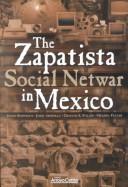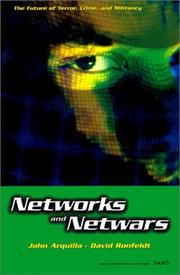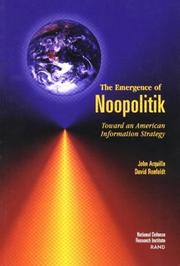| Listing 1 - 3 of 3 |
Sort by
|

ISBN: 1282451480 9786612451485 0833043323 0585246483 0833026569 9780585246482 9780833043320 9780833026569 9781282451483 6612451483 Year: 1998 Publisher: Santa Monica, CA Rand
Abstract | Keywords | Export | Availability | Bookmark
 Loading...
Loading...Choose an application
- Reference Manager
- EndNote
- RefWorks (Direct export to RefWorks)
The information revolution is leading to the rise of network forms of organization in which small, previously isolated groups can communicate, link up, and conduct coordinated joint actions as never before. This in turn is leading to a new mode of conflict--netwar--in which the protagonists depend on using network forms of organization, doctrine, strategy, and technology. Many actors across the spectrum of conflict--from terrorists, guerrillas, and criminals who pose security threats, to social activists who may not--are developing netwar designs and capabilities. The Zapatista movement in Mex
National security --- Internet --- Information networks --- Public opinion --- Social aspects --- Ejército Zapatista de Liberación Nacional (Mexico) --- Public opinion. --- Chiapas (Mexico) --- Mexico --- History --- Propaganda. --- Military policy. --- Automated information networks --- Networks, Information --- DARPA Internet --- Internet (Computer network) --- Armée zapatiste de libération nationale (Mexico) --- Zapatista National Liberation Army (Mexico) --- EZLN --- Zapatista Army of National Liberation (Mexico) --- Zapatistas --- Meksiko --- Stany Zjednoczone Meksyku --- Meksyk --- Estados Unidos Mexicanos --- Meḳsiḳe --- Mexique (Country) --- Messico --- Méjico --- República Mexicana --- United States of Mexico --- United Mexican States --- Anáhuac --- メキシコ --- Mekishiko --- מקסיקו --- Information services --- Information storage and retrieval systems --- Wide area networks (Computer networks) --- World Wide Web --- Maxico --- Estado de Chiapas (Mexico) --- Ejercito Zapatista de Liberacion Nacional (Mexico)

ISBN: 128228276X 9786612282768 0833032356 0833030302 9780833032355 9780833030306 9781282282766 6612282762 Year: 2001 Publisher: Santa Monica, CA Rand
Abstract | Keywords | Export | Availability | Bookmark
 Loading...
Loading...Choose an application
- Reference Manager
- EndNote
- RefWorks (Direct export to RefWorks)
Netwar is the lower-intensity, societal-level counterpart to the editors earlier, mostly military concept of cyberwar. This volume studies major instances of netwar - such as bin Laden's network of terrorists - and finds, among other things, that netwar works very well.
Cyberterrorism. --- Information warfare. --- Information warfare --- Cyberterrorism --- Criminology, Penology & Juvenile Delinquency --- Social Welfare & Social Work --- Social Sciences --- #SBIB:327.5H20 --- Attacks on computers --- Computer attacks --- Cyber attacks --- Cyber terrorism --- Cyber war --- Cyberwarfare --- Computer crimes --- Terrorism --- Military art and science --- Vredesonderzoek: algemeen --- Guerre de l'information --- Cyberterrorisme --- Electronic terrorism (Cyberterrorism)

ISBN: 1282451111 9786612451119 0833048279 0585243484 0833026984 9780585243481 9780833048271 6612451114 9780833026989 Year: 1999 Publisher: Santa Monica, CA : Rand,
Abstract | Keywords | Export | Availability | Bookmark
 Loading...
Loading...Choose an application
- Reference Manager
- EndNote
- RefWorks (Direct export to RefWorks)
Strategy, at its best, knits together ends and means, no matter how various and disparate, into a cohesive pattern. In the case of a U.S. information strategy, this requires balancing the need to guard and secure access to many informational capabilities and resources, with the opportunity to achieve national aims by fostering as much openness as practicable. The authors' term to represent such strategic balancing is guarded openness. They go on to describe noopolitik (nu-oh-poh-li-teek)--an emerging form of statecraft that emphasizes the importance of sharing ideas and values globally, princi
Information policy -- United States. --- Information society. --- International relations. --- Telematics -- Social aspects. --- United States -- Foreign relations -- 1989-. --- International relations --- Information society --- Telematics --- Information policy --- Law, Politics & Government --- International Relations --- Social aspects --- Social aspects. --- United States --- Foreign relations --- CMC systems --- Computer-mediated communication --- Coexistence --- Foreign affairs --- Foreign policy --- Global governance --- Interdependence of nations --- International affairs --- Peaceful coexistence --- World order --- Telecommunication --- Cyberspace --- National security --- Sovereignty --- World politics --- Sociology --- Information superhighway
| Listing 1 - 3 of 3 |
Sort by
|

 Search
Search Feedback
Feedback About UniCat
About UniCat  Help
Help News
News